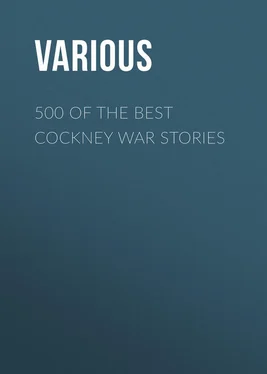Various - 500 of the Best Cockney War Stories
Здесь есть возможность читать онлайн «Various - 500 of the Best Cockney War Stories» — ознакомительный отрывок электронной книги совершенно бесплатно, а после прочтения отрывка купить полную версию. В некоторых случаях можно слушать аудио, скачать через торрент в формате fb2 и присутствует краткое содержание. Жанр: periodic, История, foreign_edu, prose_military, на английском языке. Описание произведения, (предисловие) а так же отзывы посетителей доступны на портале библиотеки ЛибКат.
- Название:500 of the Best Cockney War Stories
- Автор:
- Жанр:
- Год:неизвестен
- ISBN:нет данных
- Рейтинг книги:5 / 5. Голосов: 1
-
Избранное:Добавить в избранное
- Отзывы:
-
Ваша оценка:
- 100
- 1
- 2
- 3
- 4
- 5
500 of the Best Cockney War Stories: краткое содержание, описание и аннотация
Предлагаем к чтению аннотацию, описание, краткое содержание или предисловие (зависит от того, что написал сам автор книги «500 of the Best Cockney War Stories»). Если вы не нашли необходимую информацию о книге — напишите в комментариях, мы постараемся отыскать её.
500 of the Best Cockney War Stories — читать онлайн ознакомительный отрывок
Ниже представлен текст книги, разбитый по страницам. Система сохранения места последней прочитанной страницы, позволяет с удобством читать онлайн бесплатно книгу «500 of the Best Cockney War Stories», без необходимости каждый раз заново искать на чём Вы остановились. Поставьте закладку, и сможете в любой момент перейти на страницу, на которой закончили чтение.
Интервал:
Закладка:
We were in the Passchendaele sector in 1917, and all who were there know there were no trenches – just shell-holes half-filled with water.
Jerry had been strafing us for two days without a stop and of our platoon of twenty-three men only seven came out alive. As we were coming down the duckboard track after being relieved Jerry started to put over a barrage. We had to dive for the best cover we could get.
Three of us jumped into a large shell-hole, up to our necks in water. As the shells dropped around us we kept ducking our heads under the water.
Bert Norton, one of us – a Cockney – said: "Strike, we're like the little ducks in 'Yde Park – keep going under."
After another shell had burst and we had just come up to breathe Bert chimed in again with: "Blimey, mustn't it be awful to have to get your living by ducking?" — J. A. Wood, 185 Dalston Lane, E.8.
It was in No Man's Land, and a party of New Zealand troops were making for shelter in a disabled British tank to avoid the downpour of shrapnel. They were about to swarm into the tank when the head of a London Tommy popped out of an aperture, and he exclaimed, "Blimey. Hop it! This is a waiting room, not a blinkin' bee-hive." — A. E. Wragg, 1 Downs Road, Beckenham, Kent.
We arrived at the Cambrai front in 1917 – just a small bunch of Cockneys – and were attached to the Welsh Brigade of Artillery, being told to report to B.H.Q. up the sunken road in front of Bapaume.
En route our escort of Welshmen were telling us of the "terrible" shelling up the line. It was no leg pulling, for we quickly found out for ourselves that it was hot and furious.
Down we all went for cover as best we could, except one Cockney who stood as one spellbound watching the bursting of the shells. One of the Welshmen yelled out, "Drop down, Cockie!" The Cockney turned round, to the wonderment and amusement of the rest, with the retort, "Blimey! Get away with yer, you're windy. I've only just come out!" — Driver W. H. Allen (attached 1st Glamorgan R.H.A.), 8 Maiden Crescent, Kentish Town, N.W.1.
During severe fighting in Delville Wood in August 1916 our regiment (the East Surreys) was cut off for about three days and was reduced to a mere handful of men, but still we kept up our joking and spirits.
A young Cockney, who was an adept at rhyming slang, rolled over, dead as I thought, for blood was streaming from his neck and head. But he sat up again and, wiping his hand across his forehead, exclaimed: "Strike me pink! One on the top of my loaf of bread (head), and one in the bushel and peck (neck)." Then, slinging over a Mills bomb, he shouted: "'Ere, Fritz, my thanks for a Blighty ticket." — A. Dennis, 9 Somers Road, Brixton Hill, S.W.2.
The day after the Canadians attacked Vimy Ridge my battalion of the Royal Fusiliers advanced from Bully Grenay to a château on the outskirts of Lieven under heavy shell fire.
At the back of the château a street led to the main road to the town. There, despite the bombardment, we found a Cockney Tommy of the Buffs playing "Tipperary" on a piano which had been blown out of a house into the road.
We joined in – until a shell took the top off the château, when we scattered! — L. A. Utton, 184 Coteford Street, Tooting, S.W.
We had reached the district in "Mespot" reputed to be the Garden of Eden. One evening I was making my way with six men to relieve the guard on some ammunition barges lying by the bank of the Tigris.
We had approached to within about one hundred yards of these, when the Turks started sending over some "long-rangers." The sixth shell scored a direct hit on the centre barge, and within a few seconds the whole lot went up in what seemed like the greatest explosion of all time. Apart from being knocked over with the shock, we escaped injury, with the exception of a Cockney in our company.
Most of his clothing, except his boots, had been stripped from his body, and his back was bleeding. Slowly he struggled to his hands and knees, and surveying his nakedness, said: "Now where's that blinkin' fig tree?" — F. Dennis, 19 Crewdson Road, Brixton, S.W.
A forward observation officer of the Artillery was on duty keeping watch on Watling Crater, Vimy Ridge, towards the end of 1916.
The observation post was the remains of a house, very much battered. The officer had to crawl up what had once been a large fireplace, where he had the protection of the only piece of wall that remained standing.
He was engrossed on his task when the arrival of a "Minnie" shook the foundations of the place, and down he came in a shower of bricks and mortar with his shrapnel helmet not at the regimental angle.
A couple of Cockney Tommies had also made a dive for the shelter of this pile of bricks and were crouching down, when the officer crawled from the fireplace. "Quick, Joe," said one of the Cockneys, "'ang up yer socks – 'ere comes ole Santa Claus!" — A. J. Robinson (late Sergeant, R.F.A.), 21 Clowders Road, Catford, S.E.6.
It was on the night of October 27, 1917, at Passchendaele Ridge. Both sides were "letting it go hell for leather," and we were feeling none too comfortable crouching in shell-holes and taking what cover we could.
The ground fairly shook – and so did we for that matter – with the heavy explosions and the din was ear-splitting.
Just for something to say I called out to the chap in the next shell-hole – a Brentford lad he was: "What d'you think of it, Alf?"
"Not much," he said, "I was just finkin' if Paderewski could get only this on 'is ol' jo-anner." — M. Hooker, 325A Md. Qrs., Henlow Camp, Bedford.
During the battle of the Somme, in September 1916, our Lewis gun post was in a little loop trench jutting out from the front line at a place called, I believe, Lone Tree, just before Combles. Jerry's front line was not many yards away, and it was a very warm spot.
Several casualties had occurred during the morning through sniping, and one enterprising chap had scored a bull's-eye on the top of our periscope.
Things quietened down a bit in the afternoon, and about 4 p.m. our captain, who already had the M.C., came along and said to our corporal, "I believe the Germans have gone."
A Cockney member of our team, overhearing this, said, "Well, it won't take long to find out," and jumping upon the fire-step exposed himself from the waist upwards above the parapet.
After a minute's breathless silence he turned to the captain and said, with a jerk of his thumb, "They've hopped it, sir."
That night we and our French friends entered Combles. — M. Chittenden (late "C" Coy., 1/16th London Regt., Q.W.R.), 26 King Edward Road, Waltham Cross, Herts.
In April 1918 our unit was billeted near Amiens in a small village from which the inhabitants had been evacuated two days earlier, owing to the German advance.
On the second day of our stay there Jerry was shelling the steeple of the village church, and we had taken cover in the cellars under the village school. All at once we heard roars of laughter coming from the street, and wondering what on earth anyone could find to laugh at, we tumbled up to have a look.
The sight that met our eyes was this: Gravely walking down the middle of the street were two of the "Hackney Ghurkas," the foremost of whom was dressed in a frock coat and top hat, evidently the property of the village maire , and leading a decorated mule upon the head of which was tied the most gaudy "creation" which ever adorned a woman's head.
Читать дальшеИнтервал:
Закладка:
Похожие книги на «500 of the Best Cockney War Stories»
Представляем Вашему вниманию похожие книги на «500 of the Best Cockney War Stories» списком для выбора. Мы отобрали схожую по названию и смыслу литературу в надежде предоставить читателям больше вариантов отыскать новые, интересные, ещё непрочитанные произведения.
Обсуждение, отзывы о книге «500 of the Best Cockney War Stories» и просто собственные мнения читателей. Оставьте ваши комментарии, напишите, что Вы думаете о произведении, его смысле или главных героях. Укажите что конкретно понравилось, а что нет, и почему Вы так считаете.












